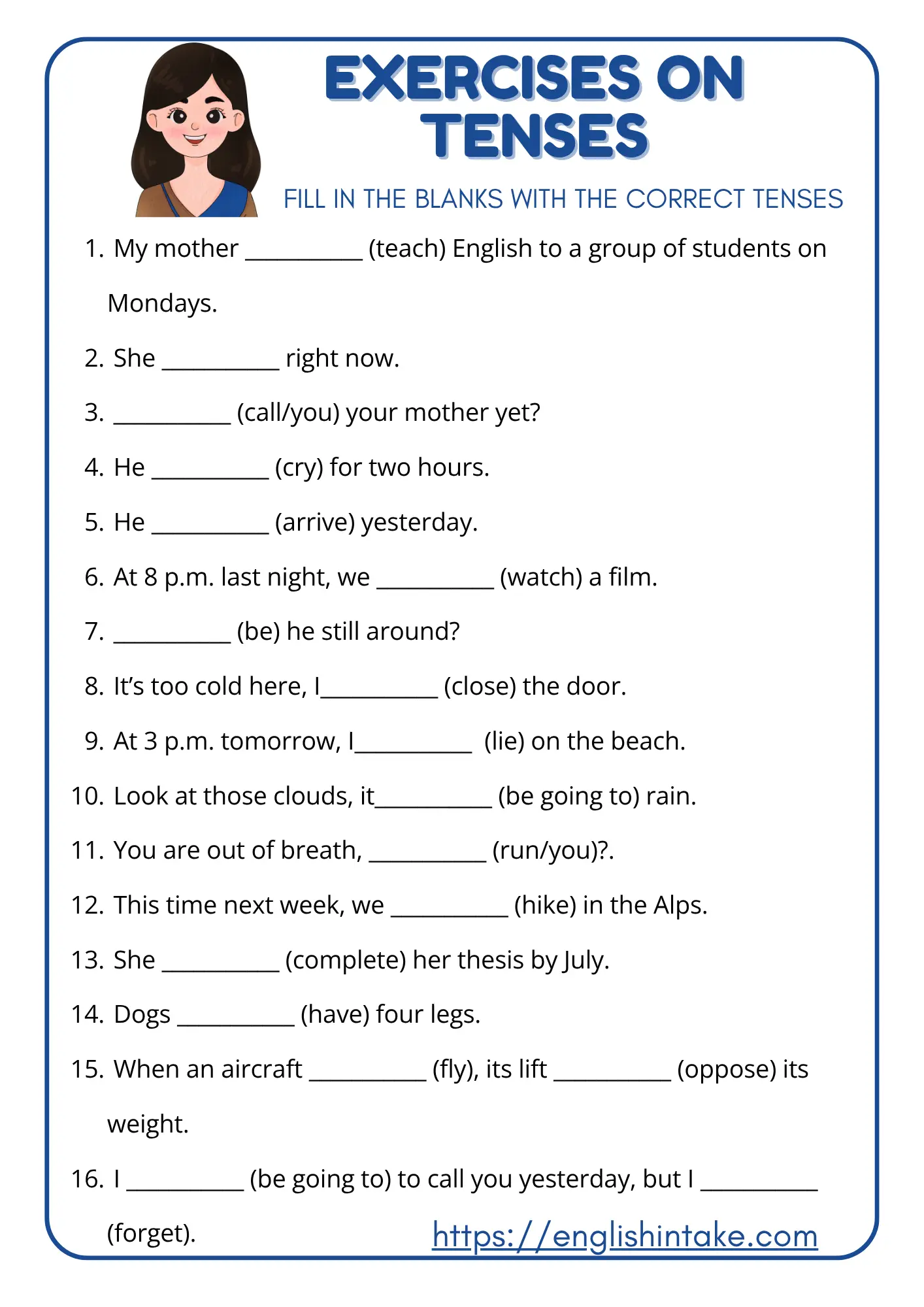These grammar exercises on tenses help you review the past, present, and future tenses in English. You can view the correct answers after responding to each question.
1. Fill in the blanks
Complete the conversations using the correct tenses of the verbs in parentheses.
1.- Carter: I couldn't hear a word you (say) when I you this morning.
- Lucas: I (be) really sorry. I (drop) my phone yesterday, and the screen (crack).
- Carter: you (think) it can be repaired?
- Lucas: I (think) so. But I (be) afraid it might be expensive.
- Carter: I (know) someone who can repair it for you.
- Lucas: That (be) wonderful! Thanks a lot!
- Carter: You (be) welcome!
- William: How you (get on) with your fever?
- Eva: I (feel) better now, but I still a little cold.
- William: you (take) any medication?
- Eva: Yes, I (take) ibuprofen.
- William: You (lose) a bit of weight. there (be) any change in your appetite?
- Eva: Yes, I (have) fatigued, and my appetite (decrease).
- William: I (be) sorry to hear that. I (hope) you (feel) better soon.
- Eva: Thank you.
2. Sentence completion
Complete the paragraphs using the correct tenses of the verbs in parentheses.
Over a million teenagers (run away) from home each year. Some (run) from intolerable situations such as physical or sexual abuse. But more often, running away is sparked by arguments with parents over such matters as curfews, school grades, household chores and choice of friends. Perhaps your parents’ outlook and thinking on matters simply not coincide with yours... (be) that any reason to rebel or run away? Besides, running away (resolve) nothing; it only (create) more problems. A few runaways actually get jobs. But for most of them, life (be) worse than it (be) before they (leave) home... Teens don’t find freedom on the streets. Instead, they (find) other runaways or throwaways like themselves living anywhere where they (have) no protection from rapists or muggers. They also (find) a lot of people who make it their dirty business to exploit young people, and teenage runaways (be) an easy target... Little wonder that many of them (end up) seriously injured or dead. It thus (make) sense to put forth every effort to talk with your parents. Let them know how you feel and what is going on. Whatever the case, talk, don’t run away. Even if life at home (be) not ideal, keep in mind that things can be even worse when you (be) on the run.
Questions Young People Ask, p. 60, Excerpt.
3. Past, present, or future?
Identify the correct tenses to use to complete the text.
UNICEF, the United Nations Children’s Fund, (work) in Africa since the organisation’s inception in 1946. Over the years, UNICEF (implement) a wide range of programs and initiatives to improve the lives of children and families across the continent. In the early days of UNICEF’s work in Africa, the organisation (focus) primarily on providing emergency aid and relief to children and families affected by war and natural disasters. This (include) delivering food, clean water, and medical supplies to those in need and providing shelter and education to displaced children.
In the 1960s and 1970s, UNICEF (begin) to expand its focus to include longer-term development programs. This (include) building schools, clinics, and other infrastructure, as well as providing training and support to local communities. One of the most notable programs during this period (be) the "Child Survival and Development Revolution", which (aim) to reduce child mortality rates by promoting basic health and nutrition practices.
In the 1980s and 1990s, UNICEF (continue) to expand its work in Africa, with a particular focus on addressing the needs of women and girls. This included programs to promote gender equality, prevent violence against women and girls and provide education and economic opportunities for women. UNICEF’s work in Africa has continued to evolve, focusing on addressing the most pressing issues facing children and families on the continent. This (include) programs to combat poverty, improve access to education and healthcare, and protect children from violence and exploitation. In addition, UNICEF also (increase) its efforts to address the impacts of climate change on children and families in Africa, including initiatives to improve water and sanitation and increase resilience to natural disasters.
Throughout its history, UNICEF (work) closely with governments, communities, and other partners in Africa to deliver programs and initiatives that meet each country’s and region’s specific needs. This (enable) UNICEF to significantly impact the lives of children and families across the continent, and the organisation (continue) to work towards a brighter future for all children in Africa.
4. Tense worksheet
In this tense worksheet, you will complete 16 sentences using the correct form of the verbs in parentheses. Click the arrow to hide/show the answers.

- My mother teaches English to a group of students on Mondays.
- She is teaching right now.
- Have you called your mother yet?
- He has been crying for two hours.
- He arrived yesterday.
- At 8 p.m. last night, we were watching a film.
- Is he still around?
- It’s too cold here, I’ll close the door.
- At 3 p.m. tomorrow, I’ll be lying on the beach.
- Look at those clouds, it's going to rain.
- You are out of breath, have you been running?.
- This time next week, we will be hiking in the Alps.
- She will have completed her thesis by July.
- Dogs have four legs.
- When an aircraft flies, its lift opposes its weight.
- I was going to call you yesterday, but I forgot.

